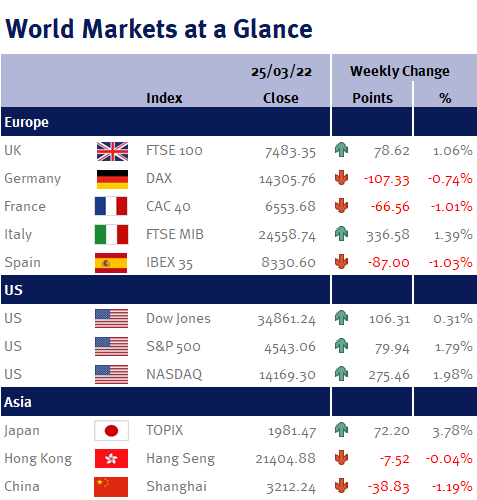Just a few short days after a 0.25% interest rate increase in both the UK and US, Lagarde was quick to point out that Europe and the US aren’t facing the same environment, and aren’t in the same phase of the economic cycle. Europe is further away from a normal interest rate environment than anywhere else globally. Furthermore, whilst both central banks will be cognisant of the war in Ukraine when looking at their monetary policy, the impact of the war will be more of a concern for Europe than the US.
Whilst the main domestic news this week was the Spring Statement, it was largely a non-event for markets. If you missed it, we gave an update on this earlier in the week.
We had talked much about oil and gas in these updates, particularly since the invasion of Ukraine by Russia, and we have discussed the volatility we have seen (and will likely continue to see) in these commodities.
In response to Russia’s invasion of Ukraine, western nations have pledged to reduce their reliance on Russian energy, which has steadily built up over the years.
Whilst this initially concerned markets, and a potential disruption caused oil and gas prices to increase, the west has made it clear that this isn’t a knee-jerk reaction – they are taking a long-term stance.
And as such, ultimately, we are not facing a lack of supply of energy issue, but a reallocation of energy supply issue. Earlier today, the US and EU announced a step towards reducing the EU’s energy reliance on Russia (the EU currently imports around 40% of its natural gas from Russia) – a deal on liquefied natural gas (LNG). The US will supply the EU with an additional 15 billion cubic metres of LNG this year, increasing to 50 billion by 2030. They will work together to store gas across Europe, and crucially build more infrastructure to receive LNG.
These sanctions against Russia have given western nations further reason to look towards means of sustainable energy for the future.
Looking ahead to the next week, some of the key data we’ll be watching out for includes US and UK GDP, PMI data in China, Eurozone inflation and US employment data.
Hannah Owen, Portfolio Specialist


